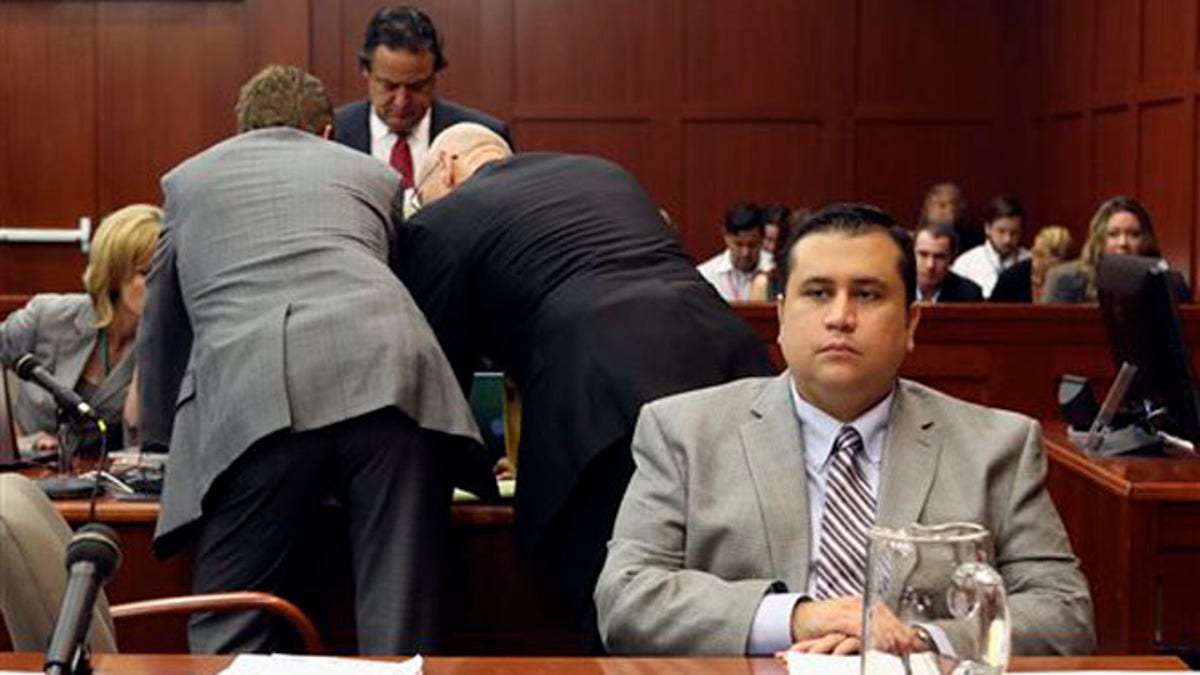
George Zimmerman sits at the defense table as his attorneys work in the background during jury selection at his trial in Seminole circuit court in Sanford, Fla., Friday June 14, 2013. (AP)
Jury selection began this week in the George Zimmerman second-degree murder trial of 17- year old Trayvon Martin. Over the course of three weeks, prosecutors and defense attorneys will whittle their way through hundreds of prospective jurors in a collective effort to choose just six jurors and four alternates.
This is not a “who done it” trial, like that of O.J. Simpson or Casey Anthony. There is no dispute Mr. Zimmerman shot and killed Mr. Martin in a central Florida neighborhood on the night of February 28, 2012.
Rather, this case is about whether Mr. Zimmerman’s actions were legal. His position is that he only acted in self-defense after Mr. Martin physically attacked him.
This defense hinges upon a Florida law that allowed him to stand his ground and meet force with force, including deadly force, if he reasonably believed it was necessary to do so to prevent great bodily harm to himself.
[pullquote]
Jury selection is much like an NFL draft. A team’s decision on whether to pick a player revolves around his skill, his personality, and whether he can help the team win. But there are no guarantees. A team may think it scored the best player of the draft, only to learn the player is a bust. (Ryan Leaf is a name that comes to mind.)
The defense and prosecution are also teams. Through the jury selection process, legally referred to as voir dire, attorneys will “strike” potential jurors they believe will not vote in their favor and will attempt to seat a juror they believe is sellable on their position. They cannot be sure of a juror's ultimate decision but they can certainly attempt to make the best picks.
Jury selection is an interview process. The best way to learn about the juror is to ask the person about his feelings on issues that are likely to arise in the case.
The death of Trayvon Martin was greatly publicized. Aside from media attention, it also sparked emotionally charged debates -- from race relations, gun ownership, self-defense, youth culture/fashion, and politics. As a result, jury selection strategy should focus heavily on potential jurors’ feelings and beliefs.
Let’s take a look at some of the prospective jurors:
Juror N-18 is a Puerto Rican male whose native tongue is Spanish. He stated that he heard about the case on the news but does not have Internet nor does he read newspapers. He only reads the Bible. He also stated that he believed Mr. Zimmerman to be guilty but that he could put his opinion aside and listen to the evidence.
On one hand, Juror N-18 may be pro-defense because Mr. Zimmerman is also a male of Hispanic descent and he saw photographs of a “hurt” Mr. Zimmerman. On the other hand, he may be pro-prosecution because he stated that he believes Mr. Zimmerman is guilty and he believes in the Ten Commandments, that “thou shall not kill.”
On Day 1, a woman with seven children and a grandmother were questioned. The women may be pro-prosecution because an unarmed, 17-year old represents one of their children or grandchildren. A man, who stated he listens to National Public Radio, may also be pro-prosecution because his choice in radio news may reveal that he has a more liberal mind.
On Day 2 of jury selection, both a man and a woman expressed fear for their safety following a verdict. Their fears may be related to deeper psychological issues with regard to violent crimes. This is a violent crime case with a defense that involves the defendant’s alleged fear for his life. These prospective jurors may be pro-defense because they can relate to Mr. Zimmerman’s fears.
Jury selection is strategy. It is just as important, if not more important, than the facts and arguments that will be presented at the trial. The wrong “pick” can lead to a losing team but the right “pick” can result in a winning verdict.








































